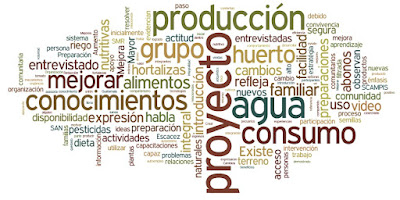 |
| Scampis Guatemala MSC analysis main results (2012) |
MSC: Stories collection
The story narrated by the project beneficiaries were about the most significant change and the challenges faced during the involvement in SCAMPIS.
The kids have been trained, so as real “reporters” they interviewed the project stakeholders, they recorded videos and took photos.
The process in each community started with a short ice-breaking capacity building of the kids, to learn how to use the video-camera, the photo-camera and to run an interview.
The kids demonstrated great interest, even if very shy at the beginning, some of them scared, after the first “interview trial” among us, found the exercise interesting, and going to the field, interview after interview they became quite experts: at the end of the day they were totally independent and capable of managing their own interview (without almost looking at the questionnaires). The activities lasted 1 entire day in each of 5 communities, at the end of the day all the kids where tired, but at the same time enriched by the experience and owners of a nice diploma.
Most important lessons:
- LEARN HOW TO ASK. The kids learned something extremely important (for the consultant unexpected): ASKING QUESTIONS. "Kids stay among kids", so usually they are not used to go to adults or old people of the village asking direct and specific questions. They understood that even if it could seem there are enormous distances between them and adults, this distances can be overcome easily.
- KIDS CAPABILITY The kids demonstrate great capability to “be reporters” few more interviews would have been enough to insure their skills as "local reporters”
- USE OF TECHNOLOGIES Despite the fact that the kid had never taken a photos or a videos, nor conducted interviews, it has been relatively easy for them to learn. A bit more difficult for them was to deal with the emotional aspect.
- PRACTICAL LEARNING The kids learned a lot about doing vegetable gardens, natural pesticides, cooking, etc, and considering that they also are involved in school garden, it has been extremely useful for them.
- At the end of the day a short brainstorming on the understanding of the interview, showed that they understood and stored the stories content.
- The questions used have been adapted and improved day by day, but still could be improved and adapted to different context. Not all the beneficiaries are able to answer in a extensive way to the questions, and not all the kids have been able to help the farmers interviewed with additional questions (e.g. I explained then to always ask, “why”, “could you give me an example?” this helped but is not enough). This aspect has to be strengthened during the kids training.
- An event with the stories and videos will be organized by the educadoras to share the experience with other kids and people of the nearby communities. The material can be used to sensitize other families.
Finally, 10 additional stories have been collected (technicians, educadoras, project supervisor, project coordinator and other stakeholders) to complete the overview of the project in order to understand the most significant change also from the point of view of the strategy adopted and the organization promoting it.
MSC: Analysis process
Below some photos taken during the analysis process:
The interviews collected has been reviewed and analysed by brainstorming and discussions about:
A. MSC from different point of view
B. Difficulties and risks perceived
C. New ideas (hidden stories)
Through the discussion 6 videos have been selected as most rapresentative of the project.
The analysis have been conducted at national (field staff and Hq. staff) and international level (Scampis India analysed the MSC Guatemala videos and viceversa). Anlaysis sheets are available upon request.
Examples of the 6 videos (national) analysis are provided here below, analysis sheet can be shared upon request.
Habla de la optimización del recurso agua a través de la introducción de SMR. Se hace énfasis en el consumo de agua segura con el apoyo del filtro para purificar agua. Alta participación de la mujer en las actividades del proyecto. Se habla sobre las preparaciones nutritivas y las capacitaciones de forma integral.
Se selecciona el video porque refleja la implementación de abonos y pesticidas naturales como parte de la estratégia del proyecto SCAMPIS Guatemala. El video refleja la aceptación y uso de los abonos para mejorar la producción hortícola.
Valentina Mendoza y Celia Ramírez - Camotan
Valentina Mendoza y Celia Ramírez - Camotan
El video refleja la organización de grupo, participación comunitaria, la introducción de hortalizas para el consumo humano, diversificación de la dieta familiar. El video refleja los cambios en la comunidad y la eficiencia de la estratégia integral.
Se observan cambios que no se habían contemplado en el proyecto, como la convivencia dentro del grupo, el compañerismo y solidaridad para resolver problemas. Se habla del proyecto integral haciéndo énfasis en la introducción de alimentos nuevos a la dieta familiar y el consumo de agua segura.

Nessun commento:
Posta un commento